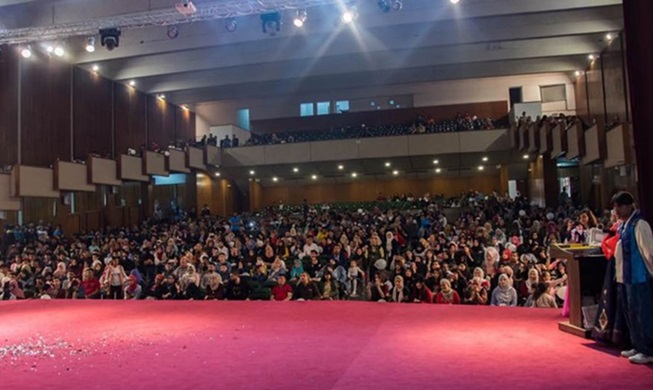Baghdad, Iraq -
Korean culture has gained prominence in the last few years around the world, but its popularity in a conservative society such as Iraq was the strangest phenomenon. Iraqi women were the most influenced by the K-pop culture, and they started changing the way they dress and behave. Many also learned the Korean language, and the number of Iraqi visitors to South Korea has increased in the last few years.
I sat with a huge fan of K-pop to discuss it. Haneen Mahmood is a 29-year-old Iraqi woman who has been a fan of K-pop since 2010.
Attraction of K-pop
In 2010, there was a channel called Korea TV. Haneen often watched Korean TV and became interested in Korean series. What attracted her the most was the world of Korea and how they live and function. Haneen began listening to songs and music, and the channel offered entertaining shows with K-pop singers. In learning more about their culture, Haneen began establishing the connections between her life and theirs. The more she learned, the more interested she became, and the more her behavior changed. Her interest did not peak with K-pop, but extended to the whole country — including Korean culture, dress, the hierarchy of society, and their history.
Then her cousins started talking about it. Haneen became a huge fan of the boy band Shinee. Haneen aged with the bands and kept following K-dramas. Super Junior was the one Haneen liked the most. The band visited Turkey in 2013, so Haneen traveled there with her brother to see them. She also went to the UAE to see them. Whenever they performed in a country close to Iraq, Haneen booked tickets, got a visa, and traveled to see them. The conservative culture appealed to her the most, as it closely resembled family relations in Iraqi culture.
While South Korean and Iraqi cultures each have unique characteristics, there are conservative similarities. Both cultures often prioritize strong family values, emphasizing respect for elders and maintaining close-knit familial relationships. Traditional gender roles are often a conservative element of both societies, with clear expectations regarding the roles of men and women. Additionally, a shared emphasis on preserving traditions, influenced by rich histories and religious beliefs, contributes to a conservative cultural ethos.
Growing loyalty
In 2016, more Korean bands, younger ones, were on the rise. But they did not attract Haneen because they started resembling Western styles. However, when those musicians went into the military, Haneen waited for Super Junior Band to finish their military service and eagerly awaited their news. She even got a tattoo with the name of the band as a reminder that she would not forget them. Haneen has maintained this love for 14 years and was determined to see them, even when she was sick. Although, once they had a concert scheduled in the UAE, and after she booked tickets, hotel, and everything else, they canceled the concert. She goes to their concerts because she does not “want them to feel disappointed”; she wants to continue seeing them and supporting them.
While some people may think that K-pop is for young people and teenagers, many older individuals have long supported them. Society may tell fans to reconsider their attachment when they are no longer young, but Haneen kept going.
K-pop helps to open Iraqi society
K-pop influenced Haneen positively, allowing her to travel more. She lived in a very conservative society but became more open and confident in traveling to other countries. Her ambitions grew, leading her to work hard and become assiduous in reaching her goal to visit South Korea.
Because of K-pop, Haneen met many people on platforms such as Twitter (aka X), expanding her knowledge of the outside world. Many women in Iraq, especially in conservative communities, have limited ways out of their conservative constraints, and one way to leave this bubble is through TV or smartphones. This provides women with the chance to enhance their knowledge about the world, expand their network, and change power dynamics in the patriarchal society, leading some to decide to marry later in life.
Additionally, South Korea, a few years ago, made it easier to reach Iraqi media consumers because the values are similar to those in Iraq. For example, issuing visas became a little bit easier, and students started visiting South Korea as part of exchange programs. And since South Korean bands began reaching the Middle East, it became even easier for Iraqi consumers to see them and develop an attachment to them.


:quality(70)/cloudfront-eu-central-1.images.arcpublishing.com/thenational/WOVIT7MYAX42XX2QDQ4KT2N37A.jpg)
